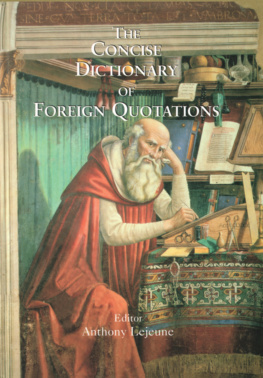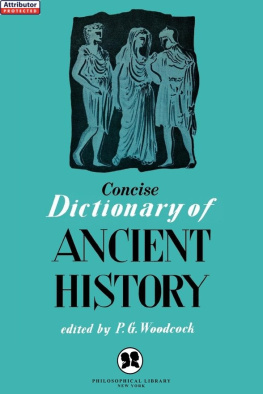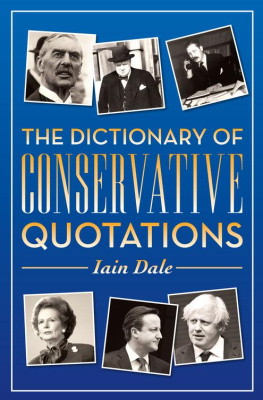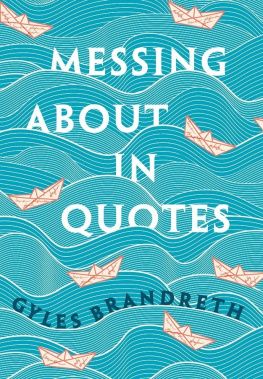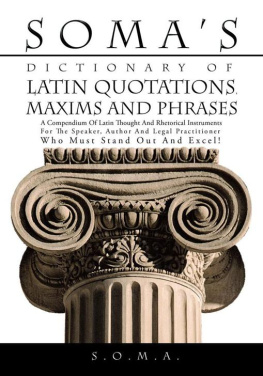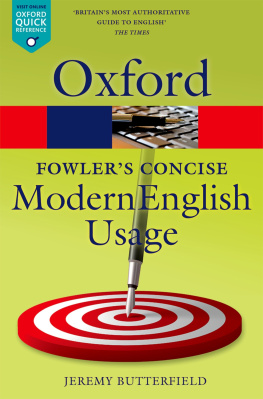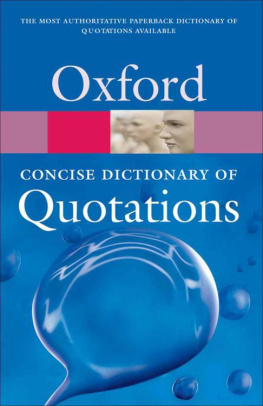Anthony Lejeune - Concise Dictionary of Foreign Quotations
Here you can read online Anthony Lejeune - Concise Dictionary of Foreign Quotations full text of the book (entire story) in english for free. Download pdf and epub, get meaning, cover and reviews about this ebook. year: 1998, publisher: Taylor & Francis (CAM), genre: Science. Description of the work, (preface) as well as reviews are available. Best literature library LitArk.com created for fans of good reading and offers a wide selection of genres:
Romance novel
Science fiction
Adventure
Detective
Science
History
Home and family
Prose
Art
Politics
Computer
Non-fiction
Religion
Business
Children
Humor
Choose a favorite category and find really read worthwhile books. Enjoy immersion in the world of imagination, feel the emotions of the characters or learn something new for yourself, make an fascinating discovery.
- Book:Concise Dictionary of Foreign Quotations
- Author:
- Publisher:Taylor & Francis (CAM)
- Genre:
- Year:1998
- Rating:3 / 5
- Favourites:Add to favourites
- Your mark:
- 60
- 1
- 2
- 3
- 4
- 5
Concise Dictionary of Foreign Quotations: summary, description and annotation
We offer to read an annotation, description, summary or preface (depends on what the author of the book "Concise Dictionary of Foreign Quotations" wrote himself). If you haven't found the necessary information about the book — write in the comments, we will try to find it.
Concise Dictionary of Foreign Quotations — read online for free the complete book (whole text) full work
Below is the text of the book, divided by pages. System saving the place of the last page read, allows you to conveniently read the book "Concise Dictionary of Foreign Quotations" online for free, without having to search again every time where you left off. Put a bookmark, and you can go to the page where you finished reading at any time.
Font size:
Interval:
Bookmark:
 The Concise Dictionary of Foreign Quotations The Concise Dictionary of Foreign Quotations Edited by Anthony Lejeune
The Concise Dictionary of Foreign Quotations The Concise Dictionary of Foreign Quotations Edited by Anthony Lejeune  First published in 2001 by Fitzrory Dearborn Publishers This edition published 2016 by Routledge 2 Park Square, Milton Park, Abingdon, Oxon OX14 4RN 711 Third Avenue, New York, NY 10017 Routledge is an imprint of the Taylor & Francis Group, an informa businessThe Concise Dictionary of Foreign Quotations Selection and arrangement Stacey London 1998 All rights reserved. No part of this publication may be reproduced or transmitted in any form or by any means without permission Editor: Anthony Lejeune Assistant Editor: Kitty Carruthers Contributing EditorsLatin Section: Anthony Lejeune French Section: Jessica Hodge German Section: Clare Haworth-Maden Italian Section: Alexandra Richardson Spanish Section: Carmen Suarez A Cataloging-in-Publication record for this book is available from the Library of Congress ISBN 13: 978-1-57958-341-5 (hbk) CONTENTS by the Publisher by the Editor Acknowledgements Many people helped in the preparation of this book, making suggestions, providing sources and checking references. Among those to whom we owe special thanks are John Crawley, Professor Sir Henry Swinnerton Dyer, Kyril Fitzlyon, Professor Jasper Griffin, the Reverend Professor Richard Griffiths, J.L.A. Hartley, Frank Johnson, Richard Lamb, Hubert Picarda QC, Professor John White, Nadine Welter and Thrse Wright. by the Publisher As the compiler of this work, Anthony Lejeune, remarks, any Dictionary of Quotations is a quarry where a reader, dropping in, can browse and inform himself and find constant delight. But one function of this present volume is entirely practical.
First published in 2001 by Fitzrory Dearborn Publishers This edition published 2016 by Routledge 2 Park Square, Milton Park, Abingdon, Oxon OX14 4RN 711 Third Avenue, New York, NY 10017 Routledge is an imprint of the Taylor & Francis Group, an informa businessThe Concise Dictionary of Foreign Quotations Selection and arrangement Stacey London 1998 All rights reserved. No part of this publication may be reproduced or transmitted in any form or by any means without permission Editor: Anthony Lejeune Assistant Editor: Kitty Carruthers Contributing EditorsLatin Section: Anthony Lejeune French Section: Jessica Hodge German Section: Clare Haworth-Maden Italian Section: Alexandra Richardson Spanish Section: Carmen Suarez A Cataloging-in-Publication record for this book is available from the Library of Congress ISBN 13: 978-1-57958-341-5 (hbk) CONTENTS by the Publisher by the Editor Acknowledgements Many people helped in the preparation of this book, making suggestions, providing sources and checking references. Among those to whom we owe special thanks are John Crawley, Professor Sir Henry Swinnerton Dyer, Kyril Fitzlyon, Professor Jasper Griffin, the Reverend Professor Richard Griffiths, J.L.A. Hartley, Frank Johnson, Richard Lamb, Hubert Picarda QC, Professor John White, Nadine Welter and Thrse Wright. by the Publisher As the compiler of this work, Anthony Lejeune, remarks, any Dictionary of Quotations is a quarry where a reader, dropping in, can browse and inform himself and find constant delight. But one function of this present volume is entirely practical. The press, contemporary literature, documentary and verbal usage are scattered with untranslated and unattributed quotations in foreign languages. How often do we know just what they mean, or where they originated? They are used for concision and precision. Thus what we offer here is a compendium of clean, sharp expression, fruits of a long tradition of eclectic thought and experience. The user of The Concise Dictionary of Foreign Quotations will find herein accuracy and a little light scholarship, and verbal discipline, covering we trust just what will be valuable to the speechmaker and the conversationalist and the attentive reader of good prose which from time to time stretches out a hand to the classics or neighbouring languages for felicity, wit, and expression. May the reader enjoy himself, and benefit. Dr. Dr.
Folliott, dryly, about one of his companions when they were revisiting Oxford, he must have finished his education at some very rigid college, where a quotation, or any other overt act showing acquaintance with classical literature, was visited with a severe penalty. For my part, I make it my boast that I was not to be so subdued. I could not be abated of a single quotation by all the bumpers in which I was fined. Does anyone read Peacock now, let alone quote him? I hope so; he was himself a great quoter and offers a merry maze of scholarly divagations. I stand entirely with Dr. Folliott in that passage from Crotchet Castle.
He in turn must surely have agreed with Dr. Johnson that classical quotation is the parole of literary men all over the world. By literary we do not, of course, mean only (or chiefly or at all) the kind who write unreadable literary novels. I would rather say that classical quotation apt quotation from the classics in any language is a sure mark of civilised men. Such quoting has become unfashionable, indeed unusual. Once upon a time, not so very long ago, even Members of Parliament indulged in it, and were not considered pretentious for doing so.
Just imagine the response if anyone ventured to make a Latin joke in the House of Commons now! What has been lost, or abandoned, is not only a valuable element in debate and conversation but much personal pleasure and solace. As Gibbon observed, pondering the Emperor Diocletians almost uniquely contented retirement from a throne to a garden (a market garden he grew cabbages), busy men of affairs often fail to acquire the art of conversing with themselves. For such inner conversation, too, quotations can play an important role. A good stock of quotations is therefore a fine thing to possess, and adding to it a lifelong pleasure. The young should be encouraged to keep a commonplace book: few practices will give them more certain satisfaction later. Any Dictionary of Quotations is a kind of commonplace book; a large quarry from which each reader, visiting it however casually, can make his own selection.
Another function for which the present volume was designed is more pragmatic. Even today one quite frequently comes across, in books or newspaper editorials, untranslated and unattributed quotations in some foreign language. Only the most incurious reader will not wish to know what they mean and who uttered them: only the most learned or the most fortunate will invariably recognise them. We have tried here to present as many as possible of the quotations which non-specialist readers are most likely to meet. Our title refers to foreign quotations. In practice this means quotations from the commonest European languages which are foreign to an English reader.
The effect is to provide a small compendium of European thought, fruits of a single civilisation, with Latin at the base. Ancient Greek should equally be there, but I was reluctantly persuaded that too many modem readers share the view of some mediaeval scribes: Graecum est. Non potest legi. To cover five languages in one modest volume is asking a lot or, one might say, asking too little of each. A much bigger book would have been easier to make. We could have gone on accumulating quotations indefinitely and enjoyably: but the result, for the reader, would have been less handy.
We aimed at a book which would be tractable, portable and therefore relatively concise. So we had to cut. Immediately, problems of definition arose. Just what is a quotation? It must surely be quotable, and, for our purpose, quotable in its original language. This criterion excludes long passages, and passages which an English-speaker is unlikely to quote other than in English (except there are always exceptions when reference to the original sheds fresh light on a familiar English version). Excluded on similar grounds are proverbial sayings which occur, without much difference, in all or several European languages.
We have tended also to exclude, as not being strictly quotations, mere idioms and phrases but, again, have allowed in a few marginal cases which we thought might be helpful. Less willingly, we have omitted some undoubted quotations, or what appear to be quotations, because, after much enquiry, we failed to discover their author. Customary attributions are often wrong. Goering, for example, may have said that when he heard the word culture he reached for his gun, but he did not originate this excellent apophthegm (or even Let them eat brioches) but the anecdote is very much older. I should have liked always to give not only the author but chapter and verse. Limitations of time and space rendered this ideal impracticable, and to pursue it patchily seemed inelegant.
But, wherever possible, we have tried to confirm the text. Even this basic exercise can raise a question, if not of principle, at least of indexing. Many familiar quotations are actually misquotations, and the misquotation may well be an improvement on the original, having been smoothed by its passage through the minds and mouths of men. However, a Book of Quotations can hardly misquote deliberately. We can only trust that a keyword in the index will enable readers to find what they seek. The same hope applies to a reader seeking (as most of us will sometimes need to do) a quotation half-remembered or wrongly remembered.
Font size:
Interval:
Bookmark:
Similar books «Concise Dictionary of Foreign Quotations»
Look at similar books to Concise Dictionary of Foreign Quotations. We have selected literature similar in name and meaning in the hope of providing readers with more options to find new, interesting, not yet read works.
Discussion, reviews of the book Concise Dictionary of Foreign Quotations and just readers' own opinions. Leave your comments, write what you think about the work, its meaning or the main characters. Specify what exactly you liked and what you didn't like, and why you think so.

